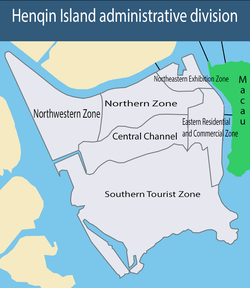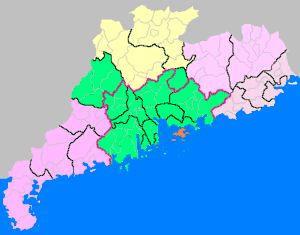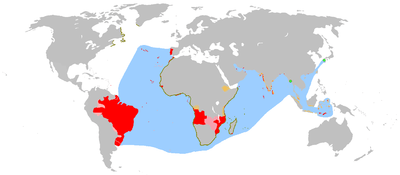Hengqin
Hengqin (simplified Chinese: 横琴岛; traditional Chinese: 橫琴島, Portuguese: Ilha da Montanha), is an island in Zhuhai, a prefecture-level city and Special Economic Zone in Guangdong Province of the People's Republic of China. It has a population of about 3,000. Parts of Hengqin were leased to Macau by the State Council of the People's Republic of China starting in 2009, with the area expanding. In the leased parts of the island, Macau law applies.
Hengqin 橫琴(镇)新区 | |
|---|---|
| Hengqin Town / Hengqin New Area | |
_of_Hengqin_New_Area.jpg) Hengqin | |
| Country | People's Republic of China |
| City/SAR | Zhuhai / Macau (leased lands) |
| Area | |
| • Total | 106.46 km2 (41.10 sq mi) |
| Population | |
| • Total | 6,300 |
| • Density | 59/km2 (150/sq mi) |
| Time zone | UTC+8 (China Standard / Macau Standard) |
| Website | Hengqin.gov.cn |
| Hengqin | |||||||||||||
|---|---|---|---|---|---|---|---|---|---|---|---|---|---|
| Chinese name | |||||||||||||
| Simplified Chinese | 横琴新区 | ||||||||||||
| Traditional Chinese | 橫琴新區 | ||||||||||||
| Literal meaning | Horizontal Piano New Area | ||||||||||||
| |||||||||||||
| Alternative Chinese name | |||||||||||||
| Simplified Chinese | 横琴岛 | ||||||||||||
| Traditional Chinese | 橫琴島 | ||||||||||||
| |||||||||||||
| Portuguese name | |||||||||||||
| Portuguese | Nova Área da Ilha da Montanha/Nova Área de Hengqin | ||||||||||||
The whole island is designated a special economic district, as Hengqin New Area, similar to Binhai New Area in Tianjin and Pudong New Area in Shanghai.
Geography
Hengqin Island is adjacent to the Taipa and Coloane districts of Macau, with the Shisanmen Waterway separating them, and is connected to Macau's Cotai via the Lotus Bridge. The island is the largest among the 146 islands of Zhuhai, being roughly three times the size of Macau. It has broad bays, sandy beaches, strangely shaped jagged rocks, scenery, and natural vegetation cover.
Hengqin was formerly made up of two islands, Xiaohengqin (小橫琴; Portuguese: Dom João) and Dahengqin (大橫琴; Portuguese: Montanha), which were recently connected as a result of land reclamation. The reclaimed island is 96 km2 (37 sq mi) large.
History
Portugal claimed both Xiao Hengqin and Da Hengqin, along with the larger former island of Wanzai (Portuguese: Lapa) — now a peninsula — to their north, as part of the Província da Macau, because "Portuguese schools are established there".[1] In 1896, Portuguese determined to occupy the two islands of Hengqin, but did not succeed in doing so. Portugal briefly occupied them before World War II.[2]
Since the land reclamation and development, there has been a growing opinion in Macau that the island should be leased to Macau, which has very limited land and little room for further development. By 1 September 2005, plans were revealed that the government of Guangdong will allow tax exemptions and adopt flexible immigration control in Hengqin to promote investment from Hong Kong and Macau.
On 27 June 2009 the government of Macau officially announced that the University of Macau would build its new campus on 1 km2 of the island, in a stretch directly facing the Cotai area, south of the current border post. This would be the first of other possible projects. Construction of the campus would take three years[3] and would include an underwater tunnel. The Standing Committee of the National People's Congress officially adopted a decision authorising Macau to exercise jurisdiction over the new campus on its opening.[4] Macau law would apply in the university campus and it would not be necessary to pass a formal border post.[5] The Macau Special Administrative Region will pay an amount of rent - which has not yet been set - for the use of the land.
In early 2013 the Macau Legislative Assembly passed Law 3/2013 providing for the application of Macau Law in the campus effective on opening day.[6] In 2020 the Macau Legislative Assembly passed Law 1/2020 providing for the application of Macau Law in a part of Hengqin Port.[7] Macau's juridisction over this area became effective on 18 March.[8]
Tourism
With Hengqin island, the goal of the authorities is to create a combined Las Vegas and Orlando for Asia, with an expansive casino offering in Macau, and at the same time non-gaming leisure and tourist activities.
In late 2005, Las Vegas Sands openly discussed its multibillion-dollar plan to develop parts of Hengqin Island into a convention and resort destination. The project was to include four million sq ft of convention space, hotels, retail, vacation homes, and golf, tennis and yachting amenities.[9][10]
On 29 November 2010, the main body of the Chime-Long International Ocean Resort (with an initial investment of 10 billion yuan) kicked off the construction on Hengqin Island and was originally expected to become operational in 2013.
The Chimelong Ocean Kingdom, consisting of entertainment facilities, amusement rides, performances, high-tech experiences and animal watching as well as the dolphin-themed hotel with 1,888 guest rooms was opened in 2014, and has been the 11th most visited theme park in the world in 2017.[11]
The Hengqin International Tennis Center opened in September 2015. It currently hosts three international competitions: the WTA Elite Trophy, the Zhuhai Open and the Asia-Pacific Wildcard Playoff for the Australian Open.[12]
Subdistricts of Hengqin New Area

- Northwestern Zone - reserved for environmentally friendly development projects
- Northern Zone - A Bridge and main entrance between Central Zhuhai and Hengqin New Area
- Northeastern Exhibition Zone - development of an exhibition center and hotels
- Central Channel - develop as a leisure and recreational theme park
- Eastern Residential and Commercial Zone - co-development of the PRC and Macau's projects such as University of Macau's new campus
- Southern Tourist Zone - A future tourism attraction which is further divided into seven sub-zones
- Theme Park Area
- Seaside Hotel Area
- Natural Tourist Area
- Scenic Area
- Water Activities Area
- Seaside Holiday Resort Area
- Golf Course Holiday Resort Area
- Hengqin Bridge
References
- Edmonds, Richard Louis (2002). "Macau in the Pearl River Delta and Beyond". French Centre for Research on Contemporary China. Archived from the original on 2005-03-14.
- "Former Foreign Colonies and Major Concessions in China". www.worldstatesmen.org.
- "Macau uni gets slice of China". The Standard. 2009-09-15. Archived from the original on 2011-06-04. Retrieved 2009-09-15.
- Decision of the Standing Committee of the National People's Assembly of the People's Republic of China on the delegation of powers to the Macau Special Administrative Region to exercise jurisdiction on the new campus of the University of Macau to be installed on Hengqin, also published via Chief Executive Notice No. 19/2009 in the Official Bulletin No. 35/2009. See Aviso do Chefe do Executivo n.º 19/2009
- "China and Macau to develop island". BBC News. 2009-09-15. Retrieved 2009-09-15.
- see Lei n.º 3/2013 Estabelece as normas fundamentais para a aplicação do Direito da Região Administrativa Especial de Macau no novo campus da Universidade de Macau na Ilha de Hengqin published in the Official Bulletin No. 8/2013.
- see Lei n.º 1/2020 Estabelece as normas fundamentais para a aplicação do Direito da Região Administrativa Especial de Macau na Zona do Posto Fronteiriço da Parte de Macau do Posto Fronteiriço Hengqin e nas suas zonas contíguas published in the Official Bulletin No. 11/2020
- "Macao law applies in an area within Hengqin Port from stroke of midnight today". Macao SAR Government Portal. 18 March 2020.
- Las Vegas Sands press release, 1/11/2007
- "Asia Resorts". Economics Research Associates. Archived from the original on 2005-02-28. Retrieved 2005-01-04.
- Maschmann, Christin (10 May 2019). "Macau's new super development: Hengqin Island". Somuchpoker.
- "Hengqin International Tennis Center". Hengqin Record. Retrieved 4 November 2018.
External links
| Wikimedia Commons has media related to Hengqin Island. |
- Hengqin Guide - News, Events and Information on the New Hengqin Area
- Hengqin New Area official website
- Hengqin.com: news and resources, mostly in Simplified Chinese
- Edmonds, Richard Louis, "Macau in the Pearl River Delta and Beyond", China Perspectives, no. 44, November–December 2002
- Satellite image by Google Maps

